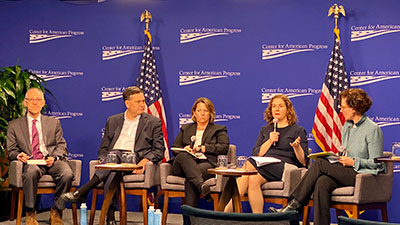General
Beyond containment

Strong public health leadership and science-based policies are needed to contain COVID-19 in the U.S., according to health experts who spoke at the Center for American Progress in Washington, D.C., last week.
In the March 6 discussion, leaders from the academic, governmental and nonprofit sectors highlighted steps the U.S. should take to ramp up its response to the growing threat. At the time, lab-confirmed cases were approaching 100,000 in 85 countries, with almost 3,400 confirmed deaths.
“The fact that 85 countries have been able to implement testing for a never-before-seen virus is something we should celebrate,” said Jennifer Nuzzo, DrPH, SM, senior scholar at Johns Hopkins’ Center for Health Security and an associate professor at the university. But other than that, there are “few opportunities to say that something good is happening.”
Both surveillance and testing for the virus have fallen short in the U.S., despite assurances from the White House, she said. Misinformation and myths have been shared, sometimes from top leaders. As health professionals and leaders work to inform the public about the prevalence, spread and mortality rate of the disease, facts and science should take precedence over politics, the experts said. “In the face of insufficient data, we need truth,” Nuzzo said.
Leaders should look for ways to lessen the risks of COVID-19 in U.S. communities, including measures such as self-isolation of people who are sick. However, many workers in the U.S. lack paid sick leave and only 30% of people can work from home, according to the Bureau of Labor Statistics.
Other concerns include a lack of health care coverage. Panelists emphasized that economic inequities need to be addressed.“We need people in the service industry, gig economy workers and others to be able to stay home from work without losing their jobs,” said Zeke Emanuel, MD, PhD, senior fellow at the Center for American Progress.
Ideally, work to contain the spread of coronavirus amid other infectious diseases needs to begin beyond U.S. borders, according to Lisa Monaco, a fellow at the Reiss Center on Law and Security at New York University School of Law. COVID-19 was first detected in China in December, but quickly spread to other countries by travelers, despite aggressive work to contain the disease.
“Disease doesn’t respect borders and it doesn’t respect walls,” said Monaco, who was a former White House homeland security advisor under President Barack Obama during the Ebola outbreak. She advocated for more foreign aid to increase global health capacity “and keep diseases at bay before they get to our door.”
On March 5, Congress agreed to provide $8.3 billion in emergency funding to address coronavirus in the U.S. The allocation, which was praised by APHA, will help public health professionals combat the ongoing outbreak and boost the development of tests and vaccines.
About $2.2 billion will be provided for prevention, preparedness and response activities at the federal, state and local level to combat the outbreak.
Watch a recording of the March 6 discussion online now.
For COVID-19 resources for the public, see APHA’s Get Ready campaign. For information for health professionals, visit APHA’s website.

